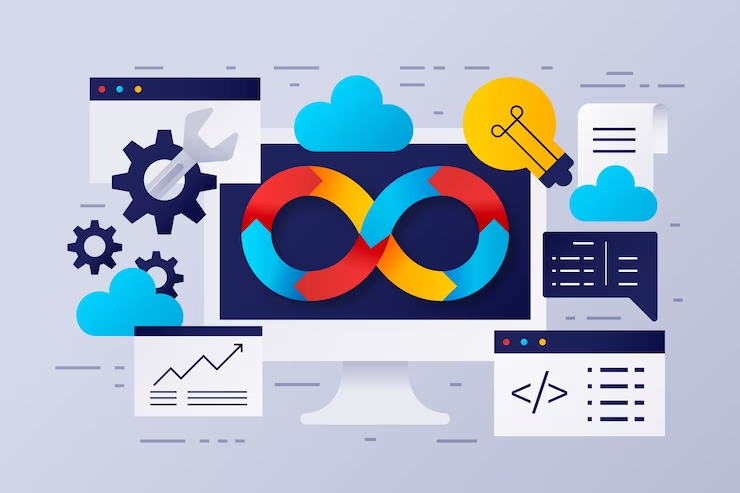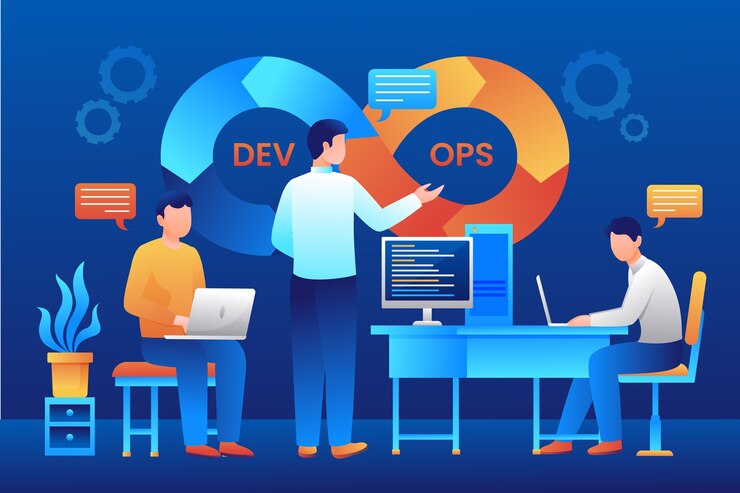Unified IT and Development: A DevOps Approach
Creating a seamless integration between your IT operations and software development teams is crucial for maintaining a fluid development pipeline.
Embracing a DevOps culture, equipped with the right tools and methodologies, can help align the objectives and workflows of your IT team, fostering a new mindset that permeates your entire organization. We are here to assist you in formulating a DevOps strategy that not only enhances collaboration and expedites product releases, but also fuels innovation, speed, and agility across your enterprise.

DevOps Strategies
Whether you’re considering the formation of an internal DevOps team or contemplating outsourcing, we’re here to guide you in pinpointing a DevOps strategy that enables quicker application development, fosters a collaborative and innovative team environment, and enhances your competitive edge.

Solution
Embracing DevOps: A Competitive Advantage
Gain a competitive edge by integrating a DevOps culture into your organization. This approach not only accelerates software delivery but also enhances the resilience and stability of your applications.
Boosting Performance
A high-performing DevOps culture not only expedites the delivery of new products and features but also attracts and retains the industry’s top talent.
Minimizing Lead Time
Significantly reduce the duration from the moment code is committed to when it is successfully deployed in production.
Enhancing Resilience and Stability
Robust DevOps methodologies enhance application resilience and stability by eliminating human error and facilitating swift recovery from system outages.
Prioritizing Security in Development
Incorporate robust security protocols into your software development process, ensuring safety without compromising on delivery speed.
Solution
DevOps Engineering Expertise
Fast-track your DevOps transition with the aid of our seasoned team.
Embracing DevOps: A Collaborative Approach
Join forces with our seasoned team to integrate a DevOps culture and practices into your organization, leveraging industry best practices.
Continual Innovation: Automating Software Development
Establish automated software development pipelines to streamline operations and minimize human error.
Choosing the Ideal Tools
Navigating through the myriad of options to select the right tools and technologies for your DevOps teams can be daunting. We offer an impartial viewpoint to help you identify the solutions that will yield the best outcomes for your specific needs.
Optimizing Skills and Knowledge
Leverage our expertise to bridge skill gaps, or collaborate with us to expedite results and facilitate knowledge transfer.Frequently Asked Questions
DevOps
What constitute the fundamental elements of DevOps?
The fundamental elements of DevOps encompass continuous integration and continuous delivery (CI/CD) practices that automate the build, test, and deployment of code modifications. These practices include: • Teamwork: DevOps is dependent on robust collaboration among development and operations teams, as well as other stakeholders such as testers, designers, and business analysts. • Automation: A crucial aspect of DevOps, automation enables teams to build, test, and deploy code alterations more rapidly and consistently. • Monitoring and Observability: DevOps teams employ monitoring and observability tools to track the performance and stability of their applications in production. • Culture: A DevOps culture values collaboration, communication, and a focus on continuous improvement. This culture is often bolstered by a set of practices and tools that enable teams to work effectively together. • Lean Principles: DevOps teams frequently utilize lean principles to optimize their processes and eliminate waste. This includes practices such as reducing lead time, improving flow, and maximizing value. • Lean Management: DevOps teams often apply lean management principles to prioritize work, optimize resource utilization, and continuously improve their processes.
How would you define Enterprise DevOps?
Could you describe some solutions that are utilized in Enterprise DevOps?
Here are some solutions for Enterprise DevOps: Team Collaboration Tools: Platforms like JIRA and Asana enable teams to plan, monitor, and discuss work throughout the development and operations process. Version Control Systems: Systems such as Git facilitate teams in managing, tracking code alterations, and collaborating on code development. CI/CD Tools: Tools like Jenkins and CircleCI automate the process of building, testing, and deploying code modifications. Monitoring and Observability Tools: Tools such as New Relic and Datadog enable teams to monitor the performance and stability of their applications in production. Infrastructure as Code (IaC) Tools: Tools like Terraform and CloudFormation allow teams to manage and provision infrastructure resources using code, automating the process of deploying and managing applications. Containerization Tools: Tools such as Docker and Kubernetes enable teams to package applications and their dependencies into container images, facilitating easy deployment and management across different environments. Test Automation Tools: Tools like Selenium and Appium enable teams to automate the application testing process, ensuring that code modifications do not introduce new bugs or regressions.
 DevOps
DevOps